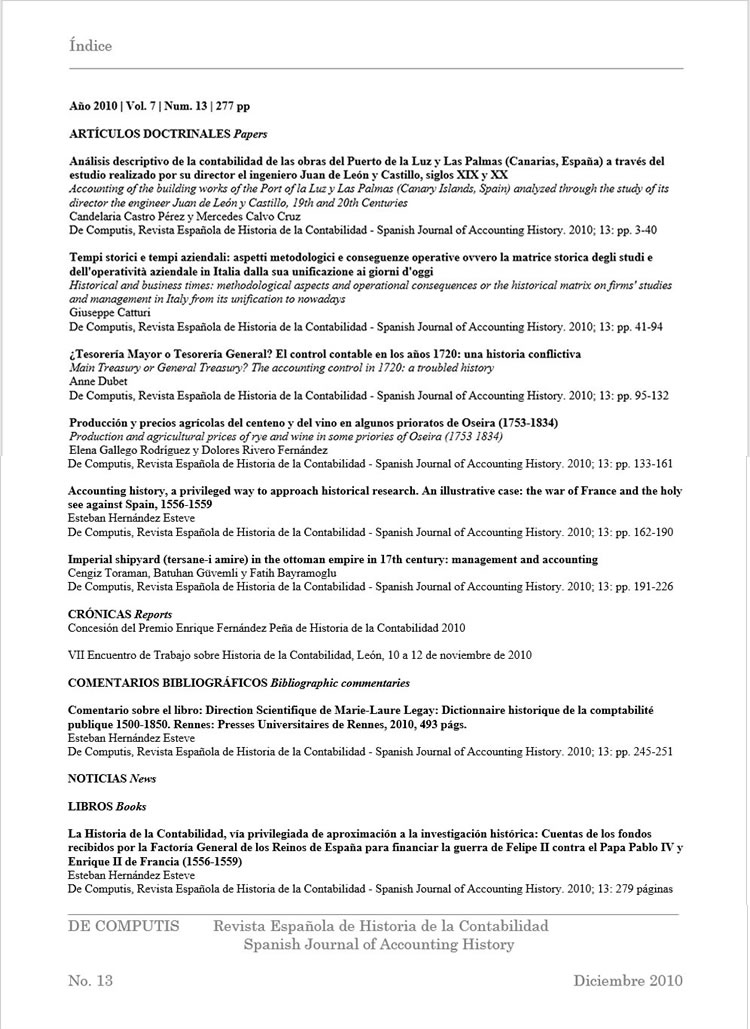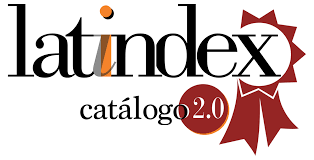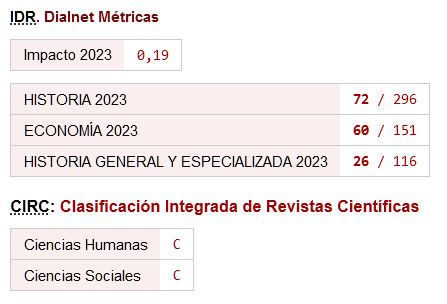Accounting history, a privileged way to approach historical research. An illustrative case
the war of France and the holy see against Spain, 1556-1559
DOI:
https://doi.org/10.26784/issn.1886-1881.v7i13.274Palabras clave:
Accounting history, Epistemology, Methodology, Concept, War, Philip II, Holy See, France, General Factory of Spanish Kingdoms, 16th centuryResumen
The international expansion of accounting history in the last fifteen or twenty years has really been impressive. It has reached a level that has opened a new stage of development, a stage that calls for a new conception of the discipline that lives up to the degree of maturity that it has reached. The new concept of accounting history has to view it not only as a study of the evolution of accounting and related matters, but as a privileged way to approach historical research as a whole. And that because all or almost all human activities have an economic aspect and therefore they need to keep accounts in one or other way.
However most historical events, even the most important, have been described and interpreted without considering at all the possible existence of accounting registers related to them. Consequently there are thousands and thousands of account books and bundles of accounting records all over the world gathering the dust of ages, because they have been never touched by a historian's hand.
Practically the only historians that base their researches on account books are the accounting historians. Thus most of them, when practising archival research, do not limit themselves to search for the evolution and changes of accounting theories, techniques or practices. They go far beyond and explore the events and operations recorded in the account books attempting to place them into the correct context in order to find out their historical significance.
They have it quite clear. What really is missing in this context is a formal statement of the authentic nature of accounting history -a sub-discipline of economic history- as a very effective way to research not only into economic subjects, but into every subject trough the accounting documentation kept because of its economic facets.
The formulation of this statement is the main purpose of the present paper. And it wants to make clear the new conception of accounting history through an illustrative case: the war held by Henry II, king of France, and the Pope Paul IV against Philip II, king of Spain, in the years 1556-1559.
Descargas
Citas
Cárceles de Gea, Beatriz (2000): "El recurso de fuerza en los conflictos entre Felipe II y el Papado: la plenitudo quaedam iuris" en Espacio, Tiempo y Forma, Serie IV, H.' Moderna, T. 13, 2000, págs. 11-60. https://doi.org/10.5944/etfiv.13.2000.3402
Gaite Pastor, Jesús (2005): "La cámara de Castilla en los siglos XVI y XVII. La instrucción de Felipe II de 1588", en IV Jornadas Científicas Sobre Documentación de Castilla e Indias en el siglo XVI, Susana Cabezas Fontanilla y María del Mar Royo Martínez (editores), Madrid: Universidad Complutense de Madrid. Universidad Complutense de Madrid. Dpto. de Ciencias y Técnicas Historiográficas, págs. 141-161.
González Sánchez, Vidal (1999): "Las tensas relaciones entre el Papa Paulo IV y la monarquía española, y la angustia para la conciencia de muchos españoles (1555-1559)", en Actas de la V Reunión Científica de la Asociación española de Historia Moderna. Vol.I: Felipe II y su tiempo, coordinador José Luis Pereira Iglesias. Cádiz : Servicio de Publicaciones de la Universidad. Asociación Española de Historia Moderna, págs. 4 79-484.
Gutiérrez, S.J., Constancio (2000): Trento, un problema: la última convocatoria del Concilio (1552- 1562), Tomo III: Fuentes, Madrid: Universidad Pontificia de Comillas.
Hernández Esteve, Esteban (1984): "Las cuentas de Fernán López del Campo, primer Factor General de Felipe II para los reinos de España (1556-1560). Contribución al estudio de la contabilidad y de la Hacienda Pública en la España del siglo XVI", in Hacienda Pública Española, núm. 87.
Hernández Esteve, Esteban (1985): "Pedro Luis de Torregrosa, primer contador del Libro de Caxa de Felipe II. Introducción de la contabilidad por partida doble en la Real Hacienda de Castilla (1592)", in Revista de Historia Económica, año III, núm. 2.
https://doi.org/10.1017/S0212610900013732
Hernández Esteve, Esteban (1986): Establecimiento de la partida doble en las cuentas centrales de la Real Hacienda de Castilla (1592). Vol. I: Pedro Luis de Torregrosa, primer contador del libro de caja , Madrid: Banco de España. Servicio de Estudios.
Hernández Esteve, Esteban (2003): "Guerra, gestión experta y contabilidad en la Real Hacienda. Movimientos internacionales de fondos a través de la Factoría General de los Reinos de España (1556-1557)", en: De Computis et Scripturis. Estudios en homenaje a Mario Pifarré Riera . Barcelona: Real Academia de Ciencias Económicas y Financieras.
Hernández Esteve, Esteban (2010): La historia de la contabilidad, vía privilegiada de aproximación a la investigación histórica: Cuentas de los fondos recibidos por la Factoría General de los Reinos de España para financiar la guerra de Felipe II contra el Papa Pablo IV y Enrique II de Francia (1556-1559), Madrid: Real Academia de Doctores de España (in printing process). https://doi.org/10.26784/issn.1886-1881.v7i13.284
Melis, Federigo (1950): Storia della Ragioneria. Contributo alla conoscenza e interpretazione delle fonti piè significativi della storia economica, Bolonia, 1950.
Pastor, Ludwig (1927): "La lucha desgraciada de Paulo IV contra la preponderancia de España". En su Historia de los papas desde fines de la Edad Media. TomoVI. Epoca de la Reforma y restauración católica, Barcelona: Gustavo Gili.
Rodríguez Pomar, Federico (1934): "En torno a la contienda entre el Papa Paulo IV y Felipe II(1556- 1557) a la luz del Archivo de Simancas", en Razón y Fe, núm. 104.
Roover, Raymond de (1937): "Aux origins d'une technique intellectuelle: la formation et l'expansion de la comptabilité à partie double", en Annales d'histoire économique et sociale, marzo, vol. IX.
Serrano Pineda, fray Luciano Ildefonso (1918): "Las causas de la guerra entre el Papa Paulo IV y Felipe II". Cuadernos de trabajos de la Escuela Española de Arqueología e Historia en Roma, IV, Madrid: Junta para Ampliación de Estudios e Investigaciones Científicas.
Steele, Mark (1986): "La Real Hacienda", en Valentín Vázquez de Prada (ed.). Historia General de España y América, Tomo VI. Madrid: Ediciones Rialp.
Ulloa, Modesto (1986): La Hacienda Real de Castilla en el reinado de Felipe II, 3ª edición, Madrid: Fundación Universitaria Española.
Descargas
Publicado
Cómo citar
Número
Sección
Licencia

Esta obra está bajo una licencia internacional Creative Commons Atribución-NoComercial-CompartirIgual 4.0.










